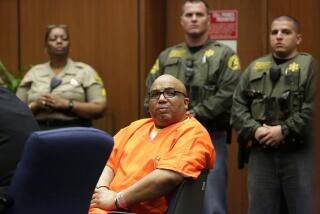Recall of judge in Brock Turner sex assault case is first since 1932
- Share via
California voters made history Tuesday, recalling a judge for the first time since 1932.
Santa Clara County Judge Aaron Persky was tossed from office, the latest legacy from the Brock Turner case. Turner was a Stanford University swimmer convicted of sexual assault. Persky’s sentencing of Brock stirred national outrage, and the recall effort.
For the record:
11:25 a.m. June 6, 2018An earlier version of this article said Persky sentenced Turner to six years in prison. The sentence was for six months.
Q: What was the Turner case about?
Turner attacked an unconscious woman behind a garbage bin on the Palo Alto university’s campus in January 2015.
At his sentencing, the Ohio native faced up to 14 years in prison. Prosecutors sought a six-year prison term.
Persky sentenced Turner to six months in jail and three years of probation. At the time, he said a lengthier penalty would have a “severe impact” on Turner.
Public criticism of the sentence escalated when the unidentified victim’s 12-page, single-spaced letter that she read aloud in court went viral after it was published by the media. She excoriated the judge for giving Turner “a soft time-out, a mockery of the [seriousness] of the assaults.”
“The seriousness of rape has to be communicated clearly, we should not create a culture that suggests we learn that rape is wrong through trial and error,” she wrote. “The consequences of sexual assault needs to be severe enough that people feel enough fear to exercise good judgment even if they are drunk, severe enough to be preventative.”
Amid uproar, Persky, who was appointed to the bench by Gov. Gray Davis in 2003, later voluntarily moved to civil court.
Q: How were battle lines divided in the recall?
The legal community has largely opposed the recall, calling it a threat to judicial independence.
More than 90 California law professors, including 20 from Stanford’s law school, have signed a statement opposing it. They say it will encourage judges to give tougher sentences and perpetuate mass incarceration.
Stanford law professor Michele Landis Dauber, who is a family friend of the victim in the Turner case, was the public face of the recall.
Recall proponents accuse Persky of being easy on criminals who come from privileged backgrounds in sexual assault and domestic violence cases.
Instead of seeing Turner as “a calculated, lying, unrepentant sex predator,” Dauber said, Persky, “refracted through the lens of privilege, sees a good kid who made a mistake.”
Persky said in an interview with The Times that he was concerned about the chilling effect a successful recall would have.
“I think it is critical to prevail because if the recall wins, it is sort of a blueprint for judicial recalls in the future,” Persky said.
Q: What is the legacy of Turner case?
The Turner case sparked much discussion — and some legal changes — on how courts deal with sexual assault.
In 2016, Gov. Jerry Brown signed bill broadened the power of judges to treat sex crimes as rape at sentencing and agreed that the crime’s punishment must include time in state prison.
Backers said the harsher consequences for sex crimes help strengthen a criminal justice system that often fails and places blame on victims.
But some crime victim advocates and associations said the new laws will disproportionately affect poor and minority defendants who receive little or no legal representation.
More to Read
Sign up for Essential California
The most important California stories and recommendations in your inbox every morning.
You may occasionally receive promotional content from the Los Angeles Times.














